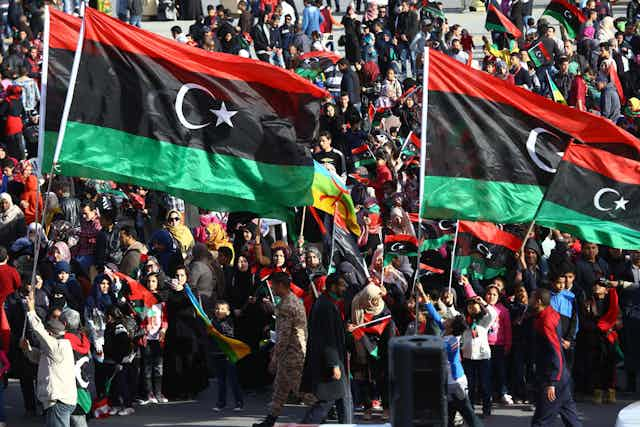The newly appointed head of the United Nations special mission in Libya, Ghassan Salamé, has announced a plan for resolving the Libyan conflict.
This amendment of the failed 2015 peace deal was anticipated, with the mandate of the UN-backed Government of National Accord (GNA) established under the December 2015 deal due to expire at the end of this year.
After effectively overthrowing the Gaddafi regime through military intervention in 2011, the international community promised Libya a transition of 18 months. Now Libyans who found themselves transitioning only between a rock and hard place are being promised a fresh transition.
The ambitious plan aims to hold free and fair elections within 12 months. Once more what we see in the UN approach is an emphasis – obsession, even – with the formal aspects of democracy, and a rather thin understanding of it that downplays the social and economic requirements. For democracy can never be fully realised without addressing the severe socio-economic inequalities and insecurities that the country faces.
Three-point plan for peace
The new UN plan consists of three phases. In the first, a meeting will be held for the committee charged with amending the 2015 Libyan Political Agreement.
The second phase of Salamé’s plan is a national conference to be held under the auspices of the UN. This will bring together the “marginalised actors” of the Libyan conflict – the Islamist and secular armed groups – to launch a dialogue with the aim of integrating their members into the political process.
In the final phase, a constitutional referendum will be held, leading to general presidential and parliamentary elections.

António Guterres, the UN secretary-general, has outlined a strategy which has seven main priorities, beginning with an inclusive political process that builds on recent positive developments which included the French president, Emmanuel Macron, brokering talks between the UN-backed prime minister, Fayez al-Sarraj, and his rival, General Khalifa Haftar.
Other priorities include building government credibility with the Libyan people, and strengthening national security infrastructure. Also key will be coordinating international engagement, including the efforts of Libya’s neighbours, so that all are part of a single common agenda. Socio-economic conditions will have to improve to provide a true peace dividend that is felt by the Libyan people. There will need to be support for migrants and long-standing international norms on migration will have to be upheld. Finally, there must be support for humanitarian assistance from the international community.
As with all UN efforts at conflict resolution, Salamé and Guterres have emphasised that an effective outcome will only come from Libyans themselves, not from the international community which can only facilitate and support the process.
Salamé has downplayed the failure of the international community to unify Libya since the fall of Muammar Gaddafi. Unsurprisingly, neither has he referred to the role of the 2011 NATO-led intervention in creating this endless chaos.
A plan with a chance of success?
Salamé wants to end the existing political stalemate by building upon the 2015 peace deal brokered by UN. That deal has been effectively in deadlock from the word go, due to the UN-backed government’s failure to exercise any authority in the face of a rival government backed by powerful armed forces, and various militia groups. The new plan aspires to amend the National Accord and overcome divisions by making it more inclusive.
This is the result of the shift in the balance of power between the country’s competing factions over the past two years. Military strongman Haftar has enjoyed wide-ranging international support from powerful actors including Egypt, UAE, Russia and even France. The notorious general has been determined to portray himself as the only player capable of combating the growing threat posed by the increasing Islamist terrorist groups in Libya.
The West appears divided, with different priorities coming to the fore. For instance, while Italy seems more preoccupied with containing the increasing waves of migrants coming from its once “fourth shore”, France and the UK are more interested in countering the growing terrorist cells in the eastern region of the country. Ultimately these priorities have an impact on the diplomatic approach pursued by each country, depending on their preference and support for the competing factions in Libya.

Despite these differences, the West shares concerns over three main issues when it comes to conflict resolution in Libya. The first is the security of oil production for the global market. At the moment, with Haftar’s forces controlling much of its rich oil reserves, Libya has somehow managed to recover its levels of oil production.
As oil accounts for 80% of the country’s GDP, it is crucial to stabilise its production and pass control to the legitimate government of the country. At the moment, control of Libya’s oil is a factor in accelerating the conflict.
The second issue is immigration. Italy has experienced a huge increase in refugees from the war-torn country. Millions of migrants facing inhumane conditions in Libya are currently waiting to cross to Europe from Africa.
Third is the issue of terrorism. For the UK, the Libyan connection of the attacker in Manchester has the attention of the Foreign Office and foreign secretary Boris Johnson has met with each of Libya’s rival governments.
While the UN, the EU and various Western countries continue to pay lip service to the values and ideas of liberal democracy, it is clear they will work with anyone who is able to provide Libya with some sort of stability.
But when it comes to what the West is willing to recognise as the legitimate authority in post-Gaddafi Libya, history has shown that when there are pressing security issues on the agenda, room for principled foreign policy is limited.

